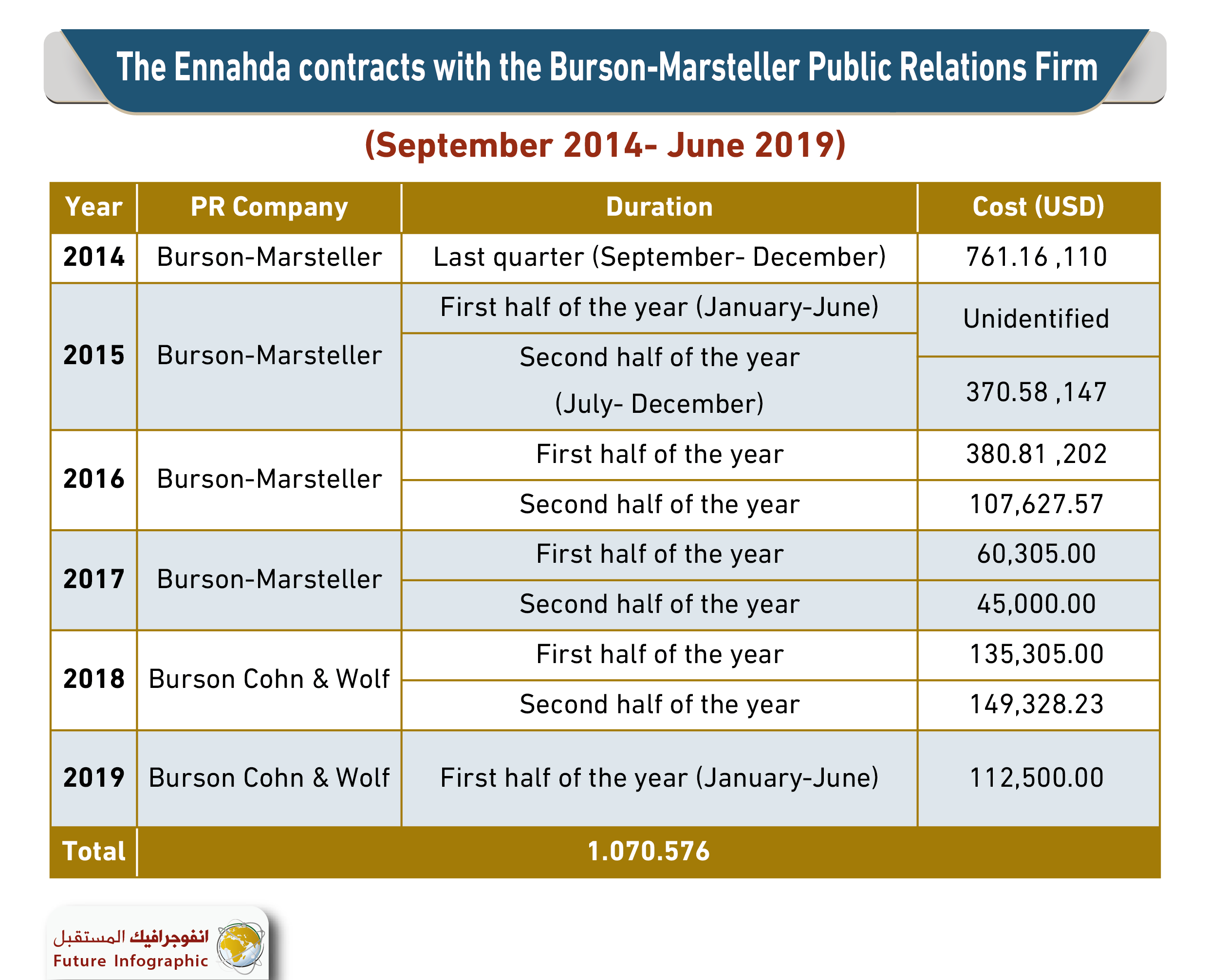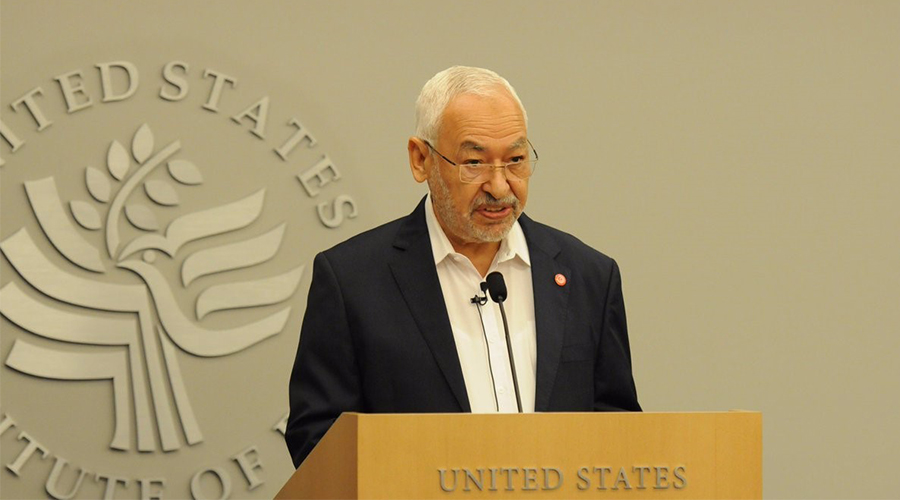The United States, with its influential institutions, plays a significant role in influencing the course of regional dynamics in the Middle East. That is why, some regional political forces are keen to enter the American political to be able to assert some influence on Washington's position. The Ennahda movement in Tunisia is a clear example, particularly as it recognizes the importance of affecting the position of the US administration and pushing it to pursue its own interests during the current crisis with President Kais Saied.
Accordingly and despite the Ennahda movement's denial of its recent contract with a PR company in Washington, the US Department of Justice confirmed the Ennahda's contract with Burson Cohn & Wolfe (BCW) dated July 28, 2021, only 3 days after the announcement of the extraordinary decisions of President Saied. Through this, the movement attempted to promote its alleged story of the ‘coup’, and to justify its position to the Biden administration, the Congress, the media and US think tanks. This raises several questions around the magnitude of the movement of the Ennahda within the US, and what messages it is attempting to deliver to US circles, and whether it will succeed in getting Washington's support on the current crisis.
PR campaigns
The contract of the Tunisian Ennahda movement with BCW is not a novel step within Ennahda movements in Washington, as the movement has been targeting US circles for years, especially the elite and opinion makers. In this respect, in September 2014, the Ennahda hired Burson-Marsteller, one of the largest US public relations companies at the time, to carry out public relations activities for the movement.
Remarkably, at that time not many details about the nature of the contract between the two parties were revealed in the official contract published by the US Department of Justice. However, the contract indicated that the company would provide two services to the Ennahda Movement, namely, assisting with media communication, as well as outreach to stakeholders of various US institutions prior to the parliamentary elections.
Based on US Department of Justice documents on lobbying and public relations activities from September 2014 to June 2019, the Tunisian Ennahda movement continued to contract Burson-Marsteller for consulting services in return for large amounts of money. In just two years, the movement's spending on public relations activities within the US reached over $1M.

*Data is from the researcher's compilation based on US Department of Justice reports. It is estimated that Ennahda's contract with BCW lasted from July 2019 to July 2021, but there is no data available for verification in this regard, particularly since the latest report of the US Department of Justice on the lobby’s activities covers the first half of 2019.
This raises many questions regarding the activity of the Ennahda movement in working to improve its image and promote its positions within US circles. Key questions here are: how and who funded the public relations activities carried out by the movement?
Regardless of the answers to these questions, arguably, these intensive and on-going public relations activities carried out by the Ennahda movement in Washington clearly contributed to the promotion of Tunisia as a unique democratic experiment within the so-called ‘Arab Spring’, and availed open channels of communication between the leader of Ennahda, Rached Ghannouchi, and between the media and US think tanks. This made liberal voices in Washington sympathize with Ennahda and its directives, despite the criticism the movement is facing within Tunisia, holding it responsible for the crises that the country is currently facing.
A new contract
Based on US Department of Justice document, the Ennahda Movement contract with the BCW on July 28 is a continuation of the movement's endeavors to conduct public relations activities in the US. However, this contract seems to be more transparent, as the US Department of Justice published a copy of the contract between the two parties, which was registered with the ministry on August 3, 2021. The new contract reflects several key aspects, such as the following:
1- The role of the Ennahda Migrants Group: remarkably, the person who signed the contract on behalf of Ennahdha was a person by the name of Ifhat Smith. He signed as the director of the Ennahdha Party Diaspora Group. However, strikingly, there are no details about this group, its composition and its association with the Ennahda movement. Additionally, the woman who signed the contract wrote a London address, confirming her residence in the UK. She supposedly plays the role of a liaison of PR activities for the Ennahda movement with the US company.
2- Contract value and cost: the value of the new contract between the Ennahda Movement and BCW is $30,000 per month, for consulting only, not including any additional expenses. The duration of the contract is two months from July 29 to September 28, 2021. This also raises the question about who pays for the PR activities carried out by the Ennahda in Washington, particularly since the movement tried to deny this contract, and announced in a press statement on its Facebook page on August 7 that “the movement did not sign, neither through its legal representative nor through any of its institutions or leaders, any contract with any foreign institution, and that the movement did not make any foreign financial transfers and did not receive any transfers or financing from abroad”. However, the movement’s statement is not consistent with the official document published by the US Department of Justice about the contract between the two parties, which raises further doubts about the credibility of the accounts promoted by the Ennahda.
3- Services of the US company: under the contract between Ennahda and BCW, the latter will provide 3 main services to the movement; This includes communicating with key stakeholders in the US, communicating with the U.S. media, and providing strategic communications consultations. These are the traditional PR activities of US PR firms.
4- Ennahda messages and their implementation mechanisms: perhaps the most significant aspect of Ennahda establishing a contract with a US public relations company is the messages that the movement aims to promote within the US circles following President Saied’s recent decisions, most notably repeating the alleged “coup” narrative, and highlighting the importance of the Tunisian democratic experience and Ennahda’s role in that, based on its vision. The mechanisms for delivering these messages are represented in articles published by BCW in the US media, such as the article published by the New York Times for Ghannouchi on July 30, in which he tried to repeat the same statements promoted by the Ennahda. Other tools include arranging meetings with media professionals and journalists in Washington, and publishing press materials defending Ennahda.
A possible limited impact
The question remains: will the public relations endeavors undertaken by BCW in favor of the Ennahda movement succeed in influencing the US position? The answer to this is related to the circles targeted by the PR company to deliver the messages of the Ennahda. Here, the dynamics of the US PR firm is unlikely to influence the position of the Biden administration in particular, since the latter evaluates its position based on determinants and factors that go beyond receiving communications from a PR company. However, the company's moves may resonate with some liberal-oriented congressional circles and media, who have a clear position on the Tunisian crisis even before this PR contract, as they adopt the narratives that Ennahda has repeated over the past years about the movement's role in the Tunisian democratic experience. Nevertheless, and regardless of the responsiveness of some voices in Washington to the moves of the PR company representing the Ennahda, the position of the Biden administration remains the key component of the US position.
In conclusion, despite the Ennahda’s denial of having concluded any contract with a US public relations company, the documents of the US Department of Justice refute this denial, which raises further doubts about the credibility of Ennahda. However, it is important to emphasize that this contract is not the first of its kind, as the Ennahda movement has been involved in PR campaigns on the US scene since 2014 with the aim of improving its image, and emphasizing specific messages pertaining to its role in the political process in Tunisia


